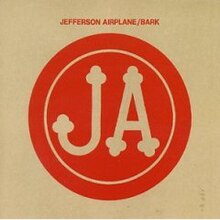
Jefferson Airplane was an American rock band based in San Francisco, California, that became one of the pioneering bands of psychedelic rock. Formed in 1965, the group defined the San Francisco Sound and was the first from the Bay Area to achieve international commercial success. They headlined the Monterey Pop Festival (1967), Woodstock (1969), Altamont Free Concert (1969), and the first Isle of Wight Festival (1968) in England. Their 1967 breakout album Surrealistic Pillow was one of the most significant recordings of the Summer of Love. Two songs from that album, "Somebody to Love" and "White Rabbit", are among Rolling Stone's "500 Greatest Songs of All Time".

Jefferson Starship is an American rock band from San Francisco, California, formed in 1974 by a group of musicians including former members of Jefferson Airplane. Between 1974 and 1984, they released eight gold or platinum-selling studio albums, and one gold-selling compilation. The album Red Octopus went double-platinum, reaching No. 1 on the Billboard 200 chart in 1975. The band went through several major changes in personnel and genres through the years while retaining the Jefferson Starship name. The band name was retired in 1984, but it was picked up again in 1992 by a revival of the group led by Paul Kantner, which has continued since his death in 2016.
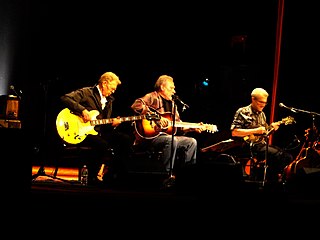
Hot Tuna is an American blues rock band formed in 1969 by former Jefferson Airplane members Jorma Kaukonen (guitarist/vocals) and Jack Casady (bassist). Although it has always been a fluid aggregation, with musicians coming and going over the years, the band's center has always been Kaukonen and Casady's ongoing collaboration.
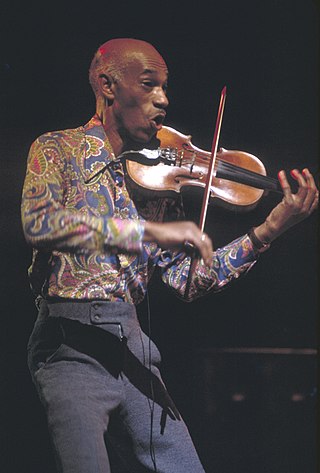
John Henry Creach, better known as Papa John Creach, was an American blues violinist who also played classical, jazz, R&B, pop and acid rock music. Early in his career, he performed as a journeyman musician with Louis Armstrong, Fats Waller, Stuff Smith, Charlie Christian, Big Joe Turner, T-Bone Walker, Nat King Cole and Roy Milton.

Jorma Ludwik Kaukonen, Jr. is an American blues, folk, and rock guitarist. Kaukonen performed with Jefferson Airplane and still performs regularly on tour with Hot Tuna, which started as a side project with bassist Jack Casady, and as of early 2019 has continued for 50 years. Rolling Stone magazine ranked him No. 54 on its list of 100 Greatest Guitarists. He was inducted into the Rock and Roll Hall of Fame in 1996 as a member of Jefferson Airplane.

John William Casady is an American bass guitarist, best known as a member of Jefferson Airplane and Hot Tuna. Jefferson Airplane became the first successful exponent of the San Francisco Sound. Singles including "Somebody to Love" and "White Rabbit" charted in 1967 and 1968. Casady, along with the other members of Jefferson Airplane, was inducted into the Rock and Roll Hall of Fame in 1996.
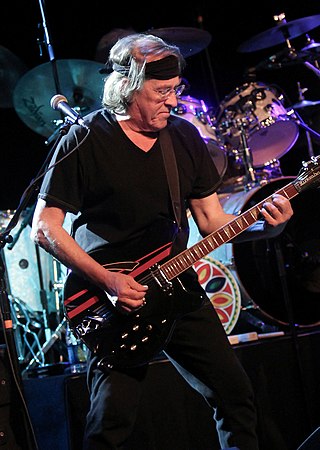
Paul Lorin Kantner was an American rock musician. He is best known as the co-founder, rhythm guitarist, and a secondary vocalist of Jefferson Airplane, a leading psychedelic rock band of the counterculture era. He continued these roles as a member of Jefferson Starship, Jefferson Airplane's successor band.

Long John Silver is the seventh studio album by the American rock band Jefferson Airplane, and their last album of all new material until 1989. It was recorded and released in 1972 as Grunt FTR-1007.

Jefferson Airplane is the eighth and final studio album by San Francisco rock band Jefferson Airplane, released on Epic Records in 1989. Marty Balin, Paul Kantner, Grace Slick, Jorma Kaukonen and Jack Casady all returned for the album and supporting tour, though Spencer Dryden did not participate. The album and accompanying tour would mark the last time Jefferson Airplane would perform together until their 1996 induction to the Rock and Roll Hall of Fame.

The Worst of Jefferson Airplane is the first compilation album from the rock band Jefferson Airplane, released in November 1970 as RCA Victor LSP-4459. The "Worst" in the title is ironic, as the album features all of Jefferson Airplane's hit singles up to that point. It peaked at #12 on the Billboard 200 in 1971 and has since gone platinum.
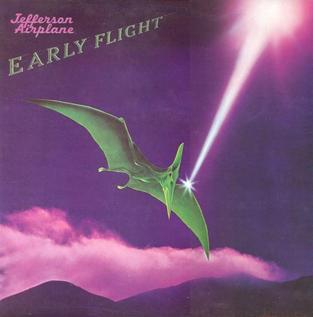
Early Flight is a 1974 compilation album by the American psychedelic rock band Jefferson Airplane, released as Grunt CYL1-0437. It features previously unreleased material from 1966, 1967, and 1970 as well as both sides of a non-album 1970 single.

Flight Log (1966–1976) is a compilation album by the American rock band Jefferson Airplane. Released in January 1977 as a double-LP as Grunt CYL2-1255, it is a compilation of Jefferson Airplane and Airplane-related tracks, including tracks by Jefferson Starship and Hot Tuna, as well as solo tracks by Paul Kantner, Grace Slick, and Jorma Kaukonen. Although primarily a compilation album, the album includes one previously unreleased song: "Please Come Back" written by Ron Nagle and performed by Jefferson Starship. "Please Come Back" is not available on any other release.

Last Flight is an authorized recording released in the United Kingdom, taken from the last live performance of the San Francisco rock group Jefferson Airplane prior to the band's dissolution in 1972. The concert was held at the Winterland Arena in San Francisco, and selected tracks were released on the 1973 album Thirty Seconds Over Winterland. Last Flight consists of the entire concert with the exception of the encore, Marty Balin's "You Wear Your Dresses Too Short", previously released on the Jefferson Airplane Loves You box-set. Balin sings lead vocals on "Volunteers" much to the surprise of the audience since he left the band in late 1970.

"Mexico" is a single released in May 1970 by San Francisco rock band Jefferson Airplane, produced by the band at Pacific High Recording Studios with Phill Sawyer as the recording engineer. Written and sung by Grace Slick, it is a tuneful rant against then-President Richard Nixon and his anti-drug initiative, Operation Intercept, that he had implemented to curtail the flow of marijuana into the United States from Mexico. The song closes with an exhortation for the young to realize the power of their numbers, as shown by the gathering of "half a million people on the lawn" at Woodstock.

Jefferson Airplane Loves You is a three-CD boxed set of recordings by the San Francisco rock band Jefferson Airplane with extensive liner notes by Jeff Tamarkin, author of the Jefferson Airplane history Got a Revolution: The Turbulent Flight of Jefferson Airplane.

Sunfighter is a 1971 album created by Paul Kantner and Grace Slick from Jefferson Airplane. The album was released shortly after the Airplane album Bark was released, and is the second record released on the Airplane's own Grunt vanity label, distributed by RCA Records. The album features a picture of their baby daughter, China Wing Kantner, on the cover. Many Bay Area musicians perform on the album, including all of the then current lineup of Jefferson Airplane, members of the Grateful Dead, Crosby, Stills, and Nash, and the horn group, Tower of Power. This album is also the first time a 17-year old Craig Chaquico recorded with Paul Kantner and Grace Slick. He would go on to become the lead guitarist for Jefferson Starship.

Grunt Records was a vanity label founded in 1971 by Jefferson Airplane and distributed by RCA Records. Initially created to sign local Bay Area acts, the label later was used only for Jefferson Starship and Hot Tuna releases. The label ended use in 1987 after Grace Slick left Starship.

Live at the Monterey Festival is a live album by the San Francisco rock band Jefferson Airplane, which was released in the United Kingdom and Europe by Thunderbolt Records in 1991. The album was authorized by the band and features the entire set from the group's June 17, 1967, performance at the Monterey Pop Festival. The album marked the first time that Jefferson Airplane's entire Monterey Pop Festival performance had been given a release by a legitimate record company.
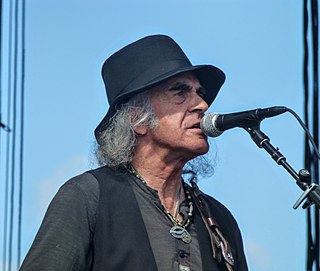
Peter Roy Sears is an English rock musician. In a career spanning more than six decades, he has been a member of many bands and has moved through a variety of musical genres, from early R&B, psychedelic improvisational rock of the 1960s, folk, country music, arena rock in the 1970s, and blues. He usually plays bass, keyboards, or both in bands.
